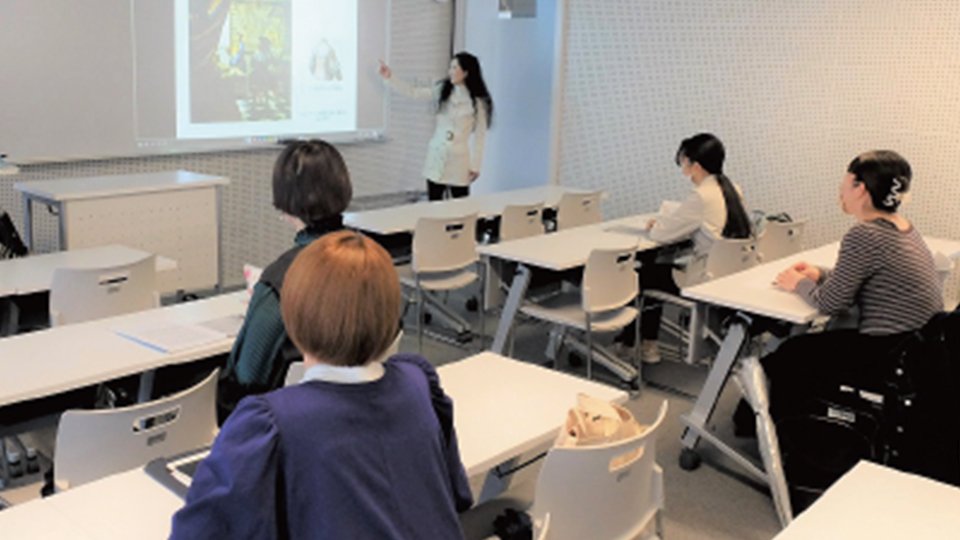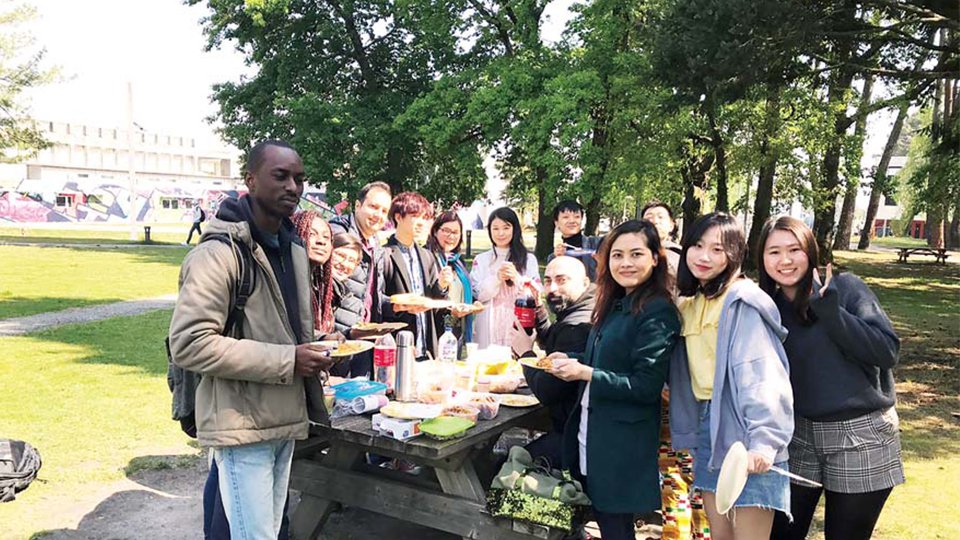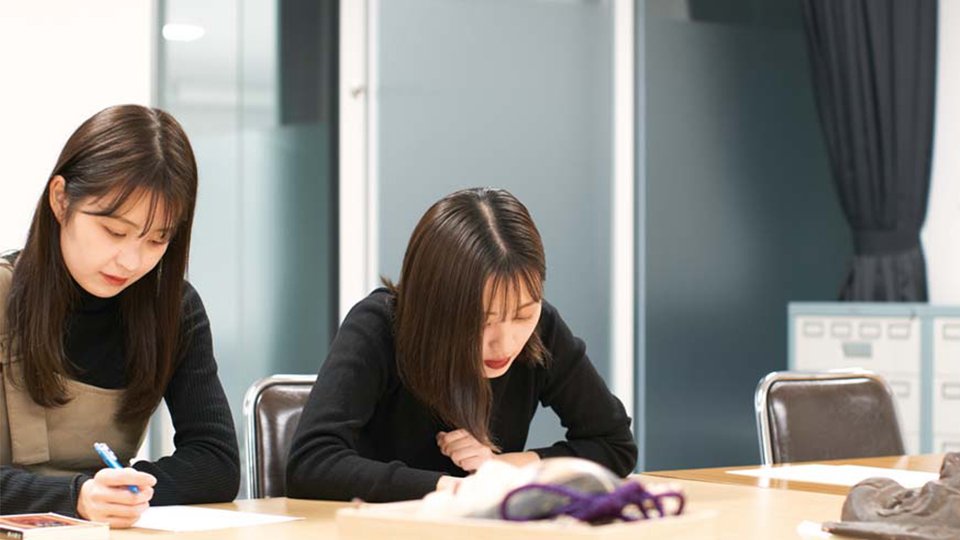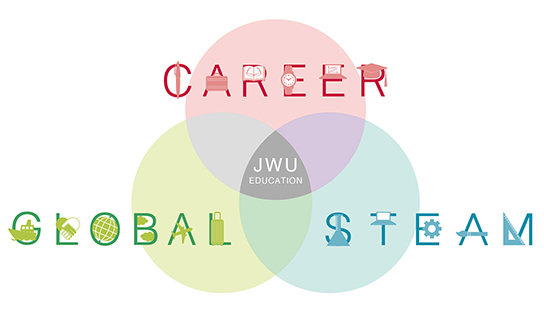Nurturing people with a perspective of multicultural coexistence through practical out-of-campus experiences
Today, we can connect with people all over the world via the internet and social networking services. On the other hand, we tend to be caught unknowingly in stereotyped ideas and frameworks (inner boundaries). This is why we now need a “transcending competence” to experience, learn about, and take part in communication with people from diverse cultures and linguistic backgrounds, thereby breaking out of our shells to move forward.
The Department of Transcultural Studies nurtures people who can transcend various boundaries such as country, language, era, and gender disparity, and create a new culture.
Features of the Department
Cultivate a comprehensive ability to transcend boundaries through diverse transcultural studies
“International culture” encompasses all aspects of regional culture and arts. In the Department of Transcultural Studies, students acquire a variety of languages (English, German, French, Chinese, and Korean), learn about the cultures of the regions where these languages are used, and deepen their understanding of a wide range of representations from art to pop culture (such as fine arts, literature, music, cinema, manga, dance, and fashion). In learning these languages, students experience them in practical "out-of-classroom, out-of-campus” programs, and by communicating their experiences broadly, they will develop the "transcending competence" to create a new cultural mindset.
New “out-of-classroom, out-of-campus” learning
The department fosters students who can contribute to solving social issues in Japan and abroad from cultural perspectives. To this end, we offer two unique programs: the Study Abroad Program (short-term study abroad program: USA, UK, Australia, France, Taiwan, Korea, Vietnam) and the Practical Program (study abroad for one semester or for one year, or attendance at a regional seminar in Japan), both of which are compulsory for all students. Through these new “out-of-classroom, out-of-campus” programs students will develop their communication and practical competences by approaching issues while experiencing different cultures both in Japan and abroad. Furthermore, the results of these studies are communicated using ICT in two or more languages.
Playing an active role in global businesses and international institutions
By acquiring a “transcending competence” and communication competence backed by high language skills and abundant overseas experience, the department develops students who can play an active role in global companies, international divisions of companies, international institutions and NPOs.
Four years of study at Department of Transcultural Studies

First year: Participating in the Study Abroad Program as an introduction to transcultural studies
All first-year students participate in the Study Abroad Program (short-term study abroad program), and those who wish to study abroad in the mid- to long-term take the “Study Abroad Seminar.” The compulsory "Basics of Transcultural Studies” provides an overview of the various studies offered by the department, while in the subject "Academic Skills I" students learn the skills necessary for university level studies.

Second year: Deepening understanding of cultures of various regions and areas
From the second year, students take "Subjects for Understanding the World and Self" (some of which can be taken from the second semester of the first year) to deepen their understanding of cultures of various regions and areas. In the compulsory “Methodology of Transcultural Studies” students learn basic research methodology for studying international cultures, and in “Academic Skills II,” they also study ICT.

Third year: Participating in the Practical Program and disseminating results in English
From the second semester of the second year to the third year, all students participate in the “Practical Programs (Overseas A, Overseas B or Domestic).” Then they disseminate the results of these practical efforts in English in “Bilingual Communication,” which is compulsory for all students. The "Seminar on Transcultural Studies A" also begins in order to help students work on their “Graduation Research.”

Fourth year: Completing a graduation research from multifaceted, logical and international perspectives
In the fourth year, in the "Seminars on Transcultural Studies A, B and C" students work on issues they set for themselves from the multifaceted, logical, and international perspectives they have acquired through their studies in and out of the classroom. As the culmination of their work students complete their “Graduation Research” (graduation thesis).
Class introduction
Third and Fourth year: Seminar in Cultural Studies 2
The world's cultures are complex yet vibrant and constantly changing

In the “Seminar in Cultural Studies 2,” students will learn about the important connections between British literature, film, art, architecture, and music. Students will explore the various topics and concepts of the works of art, the relationship between classical and modern works, and gain an in-depth knowledge of British culture.
Lectures introduce several contrasting British cultural styles as well as tracing the connections between British culture and other nations, including the United States and countries in Europe and Asia. The goal of the course is to enable students to understand culture as a complex, yet vibrant and constantly changing phenomena. Rather than thinking of overseas cultures in a stereo-typed manner, it is hoped that students think more critically about them.
The aim of the course is to ensure that students are actively involved in the class. They work in small groups to answer multiple choice questions, anticipate lecture content, and think about and discuss various issues. The ultimate goal is for students to become active thinkers and researchers. This helps them to find and investigate their own research interests for their graduation theses.
Faculty member introduction
Faculty members with a wide range of specialties provide education.

